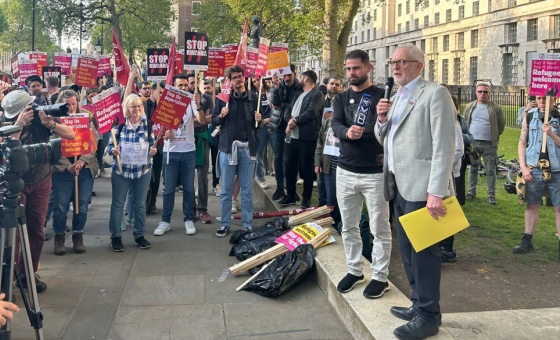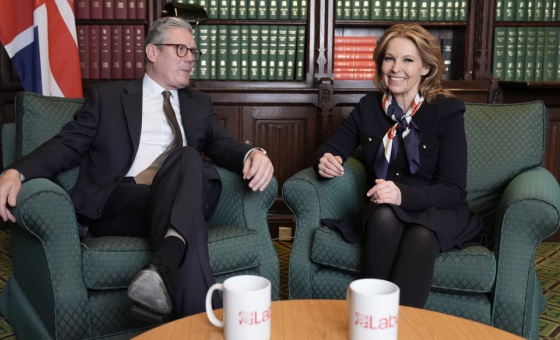This is the last article you can read this month
You can read more article this month
You can read more articles this month
Sorry your limit is up for this month
Reset on:
Please help support the Morning Star by subscribing here
Just before the general election, the Electoral Commission released details of an extra £2.3 million in donations to the Tory Party.
The commission, which oversees party donations, was listing the cash that helped fund Cameron’s return to Number 10.
It also showed the continuing close links between the Conservatives and the financial sector. And the links between the Tories and “mega basements.”
The donations included £100,000 from Reade Griffiths, a US hedge fund manager, who runs his investment company from an office in Chelsea, a short walk from Sloane Square tube. Forbes magazine called him the “bad boy of hedge funds,” describing him as “a poster child for what’s wrong with the hedge fund industry these days,” because he squeezed his investors so hard to get his hands on their cash.
Griffiths has also been in the news because he is digging a vast underground lair beneath his house in Notting Hill. “Mega basements” are all the rage among London’s rich. Just having a huge multimillion -pound house in west London isn’t enough — the very rich are digging great big basements under them, stuffing them with more “entertainment” rooms, creating “iceberg houses” where much of the property is below ground.
Plans for Griffiths’s mega-basement include a swimming pool, spa and cinema. It is so big that Kensington and Chelsea Council are charging him £825,000 for the right to dig.
Griffiths is not the only Tory donor with a mega basement. Edward Eisler, a former Goldman Sachs banker, gave the Conservatives £50,000 last September. He is building a massive basement under his seven-bedroom Holland Park home. The plans include a private art gallery to house his wife’s collection of modern art, an underground cinema, a play room, a massage room, a steam room, a sauna and a gun room.
Arne Groes, the London-based head of global sales for French bank BNP Paribas, gave the Conservatives £50,000 at the same time as Eisler. He, like Eisler, submitted plans for a basement, although a slightly less mega one.
When it comes to mega basements, Tory donors are, it seems, all in them together.
The Conservatives’ complete failure to help ordinary people get homes has a context — the party is funded by people from the financial sector who are so rich that they have houses with huge underground extensions. The kind of houses that a James Bond villain would live in.
Labour Party leadership
WATCHING new MP Keir Starmer interviewed on Newsnight, I got a sense of how far Labour has travelled from its roots.
Starmer was interviewed by Evan Davis about whether he was going to stand for Labour leader. He has only just got into Parliament but he was the Director of Public Prosecutions before that, so he is thought of as a “big fish.”
He isn’t standing for leader but what he said shows a lot of what is wrong with where Labour is now.
There is a real problem that Labour’s leadership candidates are almost all former “spads” — a narrow coterie of people who went from Oxbridge into political posts as special advisers with little in-between — have trouble leading a party aiming to appeal to the mass of working folk. They make it a neutered, Establishment body.
In the interview, Starmer agreed it is a problem that there are “fewer and fewer people with real experience in Parliament.” He thought Labour “need a mix” of experience among their MPs and that they need “outsiders” rather than the “established Westminster lot.” But according to Starmer they need outsiders, “whether it’s lawyers or frankly doctors and consultants, experts in the NHS.”
If Labour’s MPs think lawyers and hospital consultants are “outsiders,” we are in trouble. Why not nurses? Or hospital cleaners? Or shop assistants? Or call centre workers?
Keir was named by his Labour-supporting parents after Keir Hardie, founder of the Labour Party. The latter wasn’t a lawyer or a hospital consultant. He’d never been the Director of Public Prosecutions. Keir Hardie was a miner, as was Nye Bevan. Ernie Bevin was a lorry driver.
Many of Labour’s founders represented the people they came from. They learned their skills campaigning against the system, not helping run it — Keir Hardie was a miners’ union activist. His mum ran a soup kitchen for strikers from their family home.
Even now, some Labour MPs have done a regular job — Jon Trickett MP was a plumber and was commissioned by Ed Miliband to think about getting more working-class people into Parliament. However, it seems that for Labour such “outsiders” now means hospital consultants rather than plumbers.
As well as saying that Labour needed lawyers and hospital consultants for MPs, Starmer said Labour needed a “leader who will be able to deliver the product with credibility.” So there we are. Labour is a “product” to be sold to the public by professional people.
US legacy in Iraq
US Defence Secretary Ash Carter caused a diplomatic incident by saying that the Iraqi army had “no will” to fight, after thousands Iraqi troops fled Ramadi in the face of a much smaller Isis force. Carter is right. But he didn’t say that the Iraqi army is so weak because that is the way the US wanted it.
The US completely disbanded Iraq’s army when it occupied the nation in 2003, causing much of the chaos that has since engulfed Iraq. The US rebuilt the army but deliberately made it weak so that the Iraqi forces could not challenge the US occupiers. Every other oil-producing Middle East state has many advanced tanks and jets but until recently the Iraqi army was very lightly armoured and poorly trained.
The US also deliberately made the Iraqi state weak, so that western contractors could make huge profits doing shoddy work on Iraqi contracts. US and British occupiers also encouraged sectarianism, the better to divide and rule Iraq. The advance of Isis is the bitter fruit of the rotten policies of the US and British occupation of Iraq.










